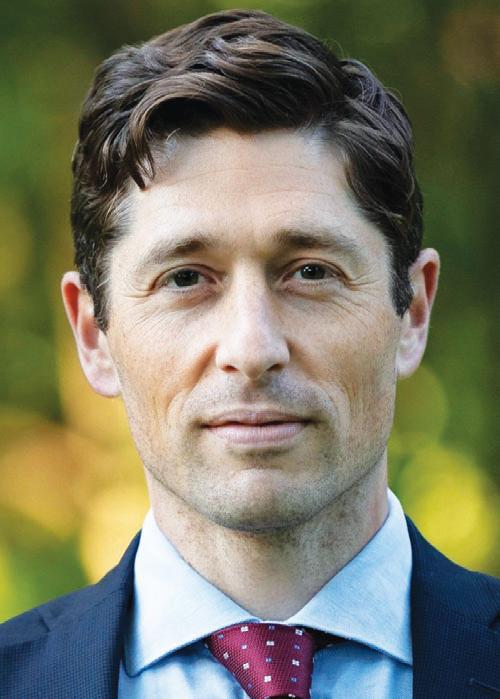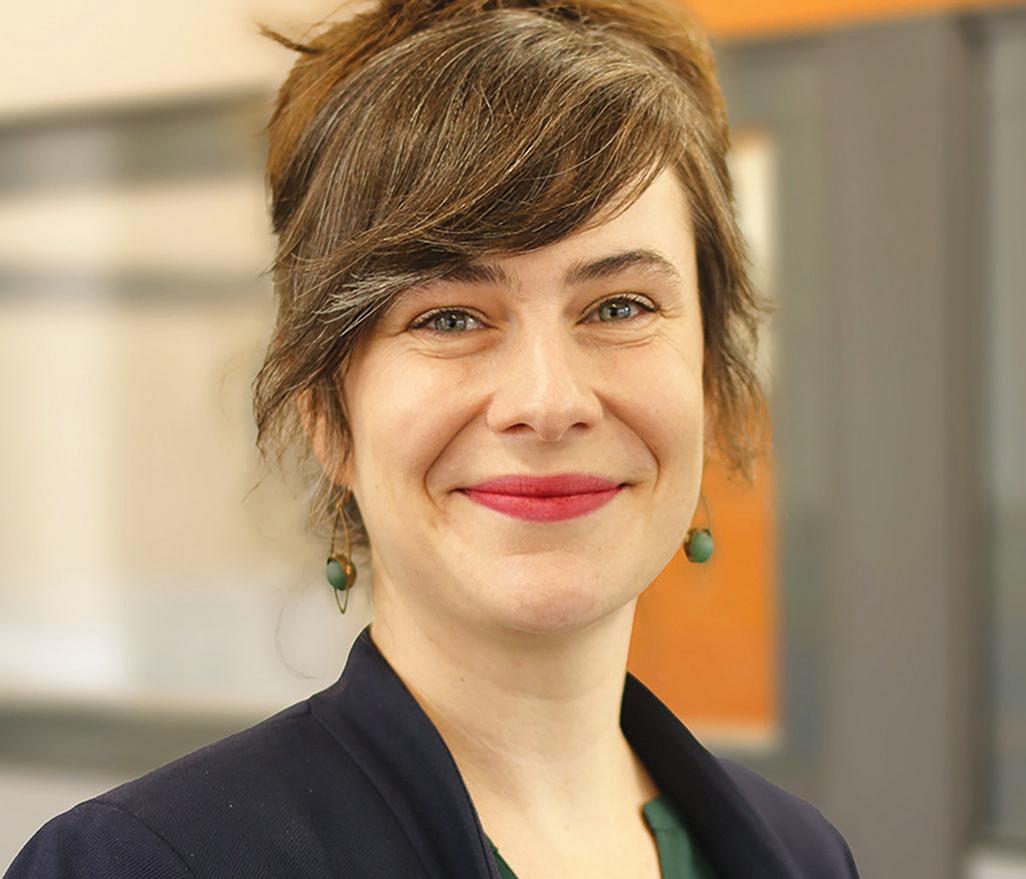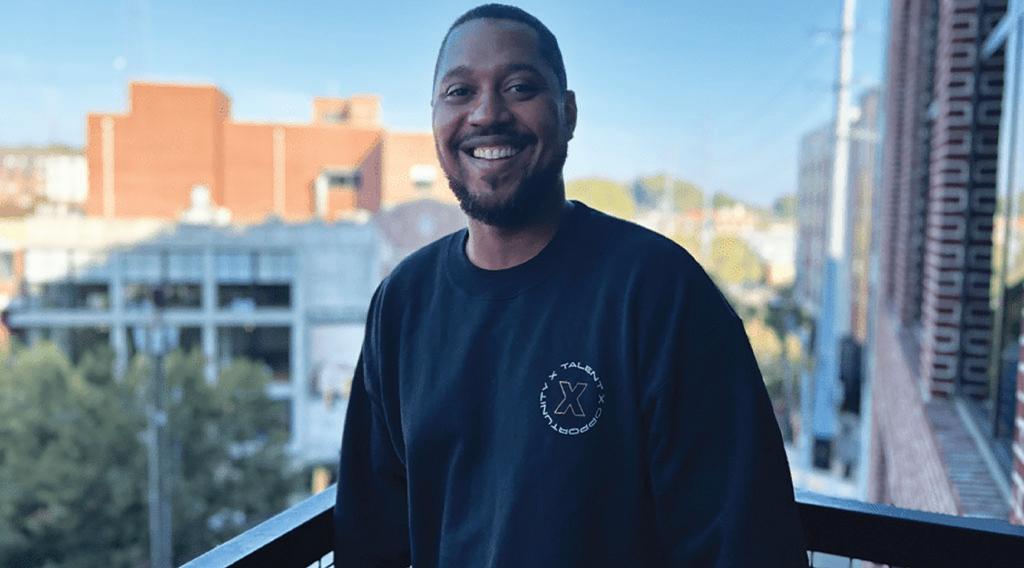

THE S TEELES THE STEELES
Celebrating Their Christmas Show 40th Anniversar y at

The Steeles are celebrating their Christmas Show 40th Anniversary at the Pantages Theater in Downtown Minneapolis on December 21 and December 22.
The band will also prominently feature international sensation Cory Wong on guitar. The show promises to get you in the Christmas spirit for the holidays.
In 1984 Steeles debuted the Christmas Show at the Cricket Theater.
Little did they know they would be doing the annual show for 40 years.
They have recorded and performed with Prince, Donald Fagen, Morgan Freeman, George Clinton, Saint Paul Chamber Orchestra, Mavis Staples, Johnny Lang, The Five Blind Boys of Alabama, the national radio broadcast A Prairie Home Companion and others throughout their long and storied career.
The family has traveled around the world in the acclaimed musical The Gospel at Colonus including a Broadway run at the Lunt Fontanne Theatre in 1988.
Their accomplishments span far and wide including corporate projects with Target, AMBEV, and Delta Airlines.
Their bold, heartfelt, melodic sounds have been shared throughout the United States and around the world including Paris, London,
Barcelona, Italy, Moscow, Brazil, and Scotland.
The Steeles have also contributed to several soundtracks including the documentary Hoop Dreams, and films Graffiti Bridge, Blank Man, Corrina, Corrina, and most recently, The Meantime on UpTV.
The siblings continue have performed in world class productions including the 150th Anniversary celebration of the renowned Mayo Clinic in 2014.
The Steele’s began their professional careers in 1982 when they began touring the of Alabama. The show toured around the world for several decades.
After releasing their first major label record releases they performed and toured with Prince.
The Steeles consists of five siblings; J.D., Fred, Jearlyn, Jevetta, and Billy Steele Their .unique singing style is an integral part of the Minnesota sound.
To their credit are several Gold and Platinum albums as well as the recent Sally Award in Education. They have released seven CDs and are currently working on the eighth; The Colors of Gershwin featuring new arrangements of the beloved music of George and Ira Gershwin. For tickets go to hennepinarts.org or Ticketmaster.com.

Veto silences workers & communities Balance or injustice?

Mayor Jacob Frey’s veto of the Minneapolis City Council’s proposal to create a Labor Standards Board reveals a startling unwillingness to ensure a voice for the city’s most vulnerable workers. Framed as a move to “encourage collaboration, not division,” Frey’s veto and counterproposal, which demands a supermajority for decisions and a 50/50 membership split between employees and employers, undermines the very idea of balance. The proposal in
question is for an advisory board—one that would have no power to enact or enforce policy but simply to bring recommendations to the mayor and council. Yet even this modest step toward giving workers and community members a voice has been rejected. This raises a troubling question: Why is amplifying the voices of the most vulnerable considered too much?
The council’s original proposal for a 15-member board — composed of five employers, five employees, and five community stakeholders — is a well-considered approach to address labor issues collaboratively. It acknowledges that workers and employers are not the only parties affected by labor standards. Communities also bear the weight of unjust wages, unsafe workplaces, and economic inequality. By removing
community stakeholders in his counterproposal, Frey would erase their voices entirely, shifting the balance of power further toward employers.
More problematic is Frey’s demand for a supermajority vote to approve any recommendations. This structure ensures that even modest proposals can be easily blocked. The veto doesn’t foster collaboration; it erects barriers that protect the status quo. Frey’s plan would hand employers disproportionate power over a process already stacked against workers and the vulnerable.
In politics, there’s a long history of denying the most vulnerable a say in shaping the policies that govern their lives. Low-wage workers, immigrants, women, and people of color are often shut out of these conversations, even though they are disproportionately affected by injustices.
Frey’s veto perpetuates this inequity, reinforcing a system where wealth and power dictate the terms.
As Dr. Martin Luther King Jr. said in his 1968 speech in Memphis, Tennessee supporting striking sanitation workers:
“If you will judge anything here in this struggle, you’re commanding that this city will respect the dignity of labor. So often we overlook the worth and significance of those who are not in professional jobs, or those who are not in the so-called big jobs. But let me say to you tonight, that whenever you are engaged in work that serves humanity, and is for the building of humanity, it has dignity, and it has worth. The council’s proposal isn’t a demand for power—it is a demand for dignity. The Labor Standards Board is a chance to amplify voices that are too often silenced.
It isn’t a threat to employers or government officials; it is a mechanism to bring forward the lived experiences of workers, to ensure that their struggles are not ignored.
Even neighboring St. Paul has demonstrated what’s possible with a commitment to labor protections. Its successful implementation of a Labor Standards Advisory Committee and a wage theft ordinance shows how cities can uplift workers without succumbing to fear of imbalance. Instead of following this example, Frey has chosen to block even the most basic step toward equity. Frey’s veto should concern anyone who values fairness. His counterproposal, with its demand for a supermajority and exclusion of community stakeholders, doesn’t just obstruct progress— it undermines the principle of collaboration he claims to support. By vetoing an advisory board, Frey has sent a clear message: the voices of workers and their communities are not a priority. This moment is about more than just a labor board. It’s about whether we believe in a

system that values every voice, not just those with wealth and power. Collaboration cannot exist without equity, and equity cannot exist without listening to those who are most vulnerable. Minneapolis workers deserve better. They are not just workers — they are our families, our friends, our neighbors. They deserve a government that
The birthday that reminds us to keep going
slow.
Birthdays are often a moment of both celebration and reflection.
They symbolize the passage of time, offering a chance to look back on what has been and imagine what could be.
As we honor what would have been Shirley Chisholm’s 100th birthday, I find myself reflecting on her life, her lessons, and the weight of the moment we are in.
I’ve been thinking a lot about what Chisholm might say to us now. For Black women, this election has left many of us grappling with grief, anger, and exhaustion. In conversations, I’ve heard the same questions echoing again and again: Why do we keep showing up for a nation that doesn’t show up for us? Why are our voices only valued when they’re needed to fix broken systems, but ignored when it’s time to share in leadership?
These are painful questions. I had to sit with my feelings the morning and weeks after the election. Like many, I questioned whether

While public outrage about President-elect Donald Trump nominating “Thing One,” disgraced former Florida Congressman Matt Gaetz, to serve as Attorney General was loud enough to convince just enough Senate Republicans to urge Gaetz to stand down and refuse the nomination in lieu of not being confirmed, “Thing Two,” disgraced former Army officer and current Fox News host Pete Hegseth, continues to march steadily towards a confirmation hearing in the Senate come January!
If you are well aware of why I described Gaetz as “disgraced,” meaning his predatory sexual towards underage girls and at least one boy, but are unaware of why I use the same to describe Hegseth, do know that:
1. In 2017, Hegseth paid an undisclosed amount of money to settle a sexual assault case brought against him by a female colleague;
2. According to Jane Meyer of the New Yorker, Hegseth was forced out of leadership positions at two advocacy groups, the Veterans for Freedom and Concerned Veterans for America, due to financial mismanagement, sexual impropriety, and personal misconduct.”
3. Meyer notes that a whistleblower complaint from the Concerned Veterans for
my efforts mattered, whether our collective contributions were enough. In that moment, it would have been so easy to disengage, to let the weight of rejection lead me to give up. But then I thought about my ancestors, their struggles, their resilience, and the paths they carved through unimaginable obstacles, and eventually, my thoughts turned to Shirley Chisholm. Her life, filled with defiance against injustice and a steadfast commitment to progress, reminded me of the enduring lessons she left behind: that setbacks are temporary, perseverance is essential, and the fight for justice must never waver.
Chisholm, the first Black woman elected to Congress, faced monumental barriers during her time. When she declared her candidacy for president in 1972, she encountered ridicule and rejection, not just from political adversaries but also from within her own party. Yet she pressed on, determined to pave a way for others. Her words resonate deeply: “I want history to remember me not just as the first Black woman to be elected to Congress, not as the first Black
America alleged that Hegseth was often publicly intoxicated at events and during one group visit to a strip club, tried to join the dancers on stage while his work subordinates watched the bacchanalian revelry.
4. Keeping with the drunken Frat Boy theme, Hegseth and his male staffers at the advocacy group divided female staffers into two categories, “party girls” and “not party girls,” before pursuing them for sexual relations—with at least one incident leading to sexual assault claims against the would be Secretary of Defense.
5. A separate whistleblower complaint alleged that on or about May 29, 2015, a drunken Hegseth loudly chanted at an event: “Kill All Muslims! Kill All Muslims!” To be clear, Presidentelect Trump knows (or should have known) this information about Mr. Hegseth, but he simply does NOT CARE; in his childish crusade against “the Establishment” in Washington, Trump has sent a clear message that his administration will not be served by the “best and the brightest,” but by the dim witted and most loyally sycophantic servants that he can find! To our chagrin, there isn’t much that can be done to offset many of these nominations no matter how ill qualified a great many of these soon to be cabinet secretaries are based upon resumes and curriculum vitae that are sorely lacking in depth!
But Hegseth, like Gaetz before him, should be pressured to decline the nomination to lead the Department of Defense! Like Gaetz, his resume is painfully light to lead the very Department charged with defending America against all enemies—both foreign and

woman to have made a bid for the presidency of the United States, but as a Black woman who lived in the 20th century and dared to be herself.”
Her story reminds us that the fight for progress is never without grief. It’s an uneven road, marked by victories and setbacks, hope and despair. Yet Shirley Chisholm never let the obstacles in her path define her. Instead, she

domestic—but more crucially, he lacks the character to lead a department that is filled with women and Muslims who serve it and in our nation’s armed forces each and every day! These civilian and military employees deserve a boss that, at minimum, isn’t some drunken lech whose behavior towards women is so offensive that even his own MOTHER wrote the following email to him during his 2018 divorce proceedings:
“On behalf of all the women (and I know it’s many) you have abused in some way, I say get some help and take an honest look at yourself…I have no respect for any man that belittles, lies, cheats, sleeps around and uses women for his own power and ego. You are that man (and have been for years) and as your mother, it pains me and embarrasses me to say that, but it is the sad, sad truth...” Mrs. Penelope Hegseth,circa 2018 Folks, if your own MOMMA has a problem with your character, then so MUST the American public! To that end, I ask each of my readers to contact BOTH of the Senators from your state—as many times as you can—and tell them that you OPPOSE Pete Hegseth’s nomination for Secretary of Defense! Chuck Hobbs is a freelance journalist who won the 2010 Florida Bar Media Award and has been twice nominated for
used them as fuel to keep moving forward. She knew that every step she took was part of something larger, a continuum of progress that would stretch beyond her lifetime.
Reflecting on Chisholm’s centennial, I’m reminded of another powerful quote: “Tremendous amounts of talent are being lost to our society just because that talent wears a skirt.” These words

Simon Burris
feel as urgent today as they did when she first spoke them.
They remind us of the systemic barriers that continue to hold women, especially Black women, back. But they also challenge us to confront those barriers and to push through them.
I think about what Chisholm might say to us now, as we navigate the aftermath of this election. I imagine she would acknowledge our grief while reminding us not to let it paralyze us. Chisholm understood that progress is built not on the absence of pain but on the determination to keep going in spite of it. “You don’t make progress by standing on the sidelines,” she said. “You make progress by implementing ideas.”
Her centennial is not just a moment to celebrate her life—it’s a call to action. It’s a reminder that our efforts, even when they feel small or unrecognized, matter. Chisholm’s life story teaches us that the fight for justice requires persistence and courage. It demands that we show up, even when the odds are against us, and that we keep pushing, even when progress feels impossibly
As we pause to reflect on the impact of this election, let us also embrace it as a time for renewal, just as our ancestors did in the face of their own struggles. Shirley Chisholm’s 100th birthday is a powerful reminder of the legacy we carry. It compels us to ask: How will we use this moment, not only to grieve what was lost, but to envision and create what is possible?
For me, the answer lies in our connection to history. Shirley Chisholm was one of the great trees, as Maya Angelou might say, whose roots run deep within us. Her life reminds us that we are part of something larger, tied to the struggles and triumphs of those who came before us. We owe it to her, ourselves, and our future to continue the work she started. Shirley Chisholm existed. Because she did, we know that the path forward is possible. Her life shows us that grief cannot define us, and setbacks cannot deter us. Let us walk forward with the same determination she embodied, ensuring that her vision of justice, equity, and opportunity lives on in everything we do.
Shirley Chisholm
Columnist
By Haley Taylor Schlitz, Esq.
Jacob Frey Mayor Jacob Frey
Pete Hegseth
By Haley Taylor Schlitz, Esq. Columnist
By Chuck Hobbs


By Steve Karnowski Associated Press
Minnesota Republicans filed a lawsuit last Monday to try to force a rerun of a state House race where the incumbent Democrat won by 14 votes — but in which investigators concluded that election workers probably destroyed 20 valid absentee ballots after failing to count them. It’s a race that could determine the balance of power in the Minnesota House, where leaders from both parties are working out the details of a power-sharing agreement that currently presumes a 67-67 tie when the Legislature convenes next month. A Republican victory in a special election could shift that balance to a two-vote, 68-66 GOP majority.
Democrats have a one-vote majority in the state Senate. So regardless of the outcome in the disputed race, Minnesota will be returning to some degree of divided government in 2025 after two years of full Democratic control. “The actions of Scott County elections officials constitute a serious breach of not only Minnesota Election
Law, but the public trust in our electoral system,” the lawsuit said.
Democratic Rep. Brad Tabke was declared the winner last week of the swing suburban Shakopee-area District 54A race by 14 votes after a recount and the official canvass. But Scott County election officials had said earlier, after a post-election
Minnesota Attorney General Keith Ellison announced last week that he has reached a settlement with Minneapolis nonprofit Youth Leadership Academy d/b/a Gar Gaar Family Services (“Gar Gaar”), that requires the organization to dissolve in the wake of its violations of state laws concerning self-dealing and governance. The settlement does not preclude any future claims against individuals.
In the settlement, filed in Hennepin County District Court, the Attorney General alleges that Gar Gaar paid more than $100,000 to a for-profit company owned by two of Gar Gaar’s officers and that an audit found several significant deficiencies in Gar Gaar’s internal controls, among other issues. Gar Gaar, created in 2020 at the height of the COVID-19 pandemic, agreed to dissolve.

“Charitable nonprofits hold assets in trust for the public, not their directors, and nonprofit board members are obligated to act in the organization’s best interests, not their own,” Attorney General Ellison stated. “Gar Gaar’s leaders seemed not to understand either of these crucial facets of Minnesota nonprofit law, so I am shutting them down.” Gar Gaar participated in the federal child nutrition program in the summer of 2021. When it applied to participate in the year-round
Agribusiness giant Cargill is laying off thousands of its employees.
Cargill confirmed this week that it would be reducing its global workforce by about 5%. In a statement sent to The Associated Press on Tuesday, the food production company said that the cuts were part of a long-term strategy “to strengthen Cargill’s impact,” which includes realigning resources.

Minnesota-based Cargill did not immediately provide further specifics around the layoffs. But a 2024 annual report from the company noted that it had more than 160,000 employees worldwide, meaning the latest job cuts would be set to impact around 8,000 workers.
As a privately-held company, Cargill doesn’t regularly publish its finances
Karla Henderson takes over as Pride in Living’ (PPL) new president and Chief Executive Officer, effective January 6, 2025.
Henderson has more than 20 years of experience working with communities improve equity through community development, urban planning, and capital investment. “She is uniquely qualified and poised to lead PPL into its next era of equitable development and community innovation,” PPL’s board of directors said in announcing the appointment last week.

Henderson joined PPL as Senior Vice President of Housing Stability in March 2024, managing housing operations, including real estate development, resident services, and property and asset management. She led PPL’s equitable development approach to financing and services for new and existing affordable housing projects. Previously, Henderson was the Director of Community Development at the City of Bloomington, Minnesota and was responsible for creating
By Jake Offenhartz, Karen Mathews and Michael R. Sisak




The Cultural Wellness Center is a transformative space dedicated to guiding individuals from a focus on race to a deeper connection with culture. Through experiential learning, research-based classes, coaching, consulting, and certification programs, it empowers personal healing, strengthens communities, and equips organizations to build inclusive, culturally rich environments.
“Healing is contagious, and this gathering represents a return to the spirit of freedom, unity, and resilience. This is a sacred celebration acknowledging our unbreakable spirit,” the organization said in a press release.

The Cultural Wellness Center creates a space and owns a process for people to study their own culture, practice rituals and ceremonies, and come together with people from other cultures. For nearly 30 years, its mission has been to “unleash the power of citizens to heal themselves and build community.” The Center sprimarily serve people of African heritage, through philosophies and practices rooted in African culture. But the process of cultural exploration through trainings, fellowships, dialogues, elder circles, coaching and consulting is relevant to all cultures, and engages people of all backgrounds, the Center said. Activities during the Kwanzaa celebration include storytelling, youthled activities, performances originating from across Africa, an African Fashion Show, art showcases, food, music, gift giving, honoring our elders, and

AP Photo/Stefan Jeremiah
stands on 54th Street outside the
in
where Brian Thompson, the
AP Photo/UnitedHealth
CenterPoint energy rate case settlement proposal would cut customer contributions to American Gas Association membership dues in half
Last week, parties filed a proposed settlement agreement in CenterPoint Energy’s gas rate case with the Minnesota Public Utilities Commission (the Commission).
Highlights of the proposed settlement agreement:
CenterPoint Energy would decrease the amount of money it recovers from customer bills for membership fees to the American Gas Association (AGA) by half. Membership dues to other pro-gas trade associations, like the Minnesota Blue Flame Gas Association, would be completely removed from customers’ bills.
Residential customer rates will increase substantially less than CenterPoint initially requested. The final residential rate increase would be 5.2%, which is slightly less than customers are paying now under an “interim rate adjustment” that’s currently on bills.

Members of the Clean Heat Minnesota coalition, along with dozens of customers and experts, advocated for removing all AGA dues from customer bills, noting that the AGA’s priorities and lobbying efforts contradict Minnesota’s goal of reaching net-zero greenhouse gas emissions by 2050. Earlier this year, Xcel tried to raise rates for its gas customers, in part to pay membership dues to trade associations. After an outcry of opposition from Minnesota residents, Xcel agreed not to charge its customers for AGA dues. Although CenterPoint’s agreement does not fully remove all AGA dues, it is a step in the right direction, the Coalition said.

“This settlement is a partial win for CenterPoint customers, who will now pay less to reimburse CenterPoint Energy membership in a lobbying organization that doesn’t support the transition to cleaner, safer, and more affordable energy,” said Carolina Ortiz, Associate Executive Director at COPAL, and a leader of the Clean Heat Minnesota coalition.
“Utility companies have a
clean, affordable energy to power heating, cooking, and appliances. Learn more at cleanheatmn.org.
“CenterPoint customers should not be forced to use their hardearned dollars to pay lobbyists and organizations that contradict our state’s values and goals. We thank everyone who took the time to submit a comment, and all Minnesota residents who are working together to swiftly and equitably transition Minnesota away from natural gas and toward clean, healthy energy sources that benefit all Minnesotans.”
Bridging the digital divide with Culture Wireless
By
“Why can’t we impact the infrastructure? Why can’t we own everything? Because at the end of the day, the moment we say something about it, that’s when it takes off,” said William “Bam” Sparks, 40, cofounder and Chief Marketing Officer of Culture Wireless, reflecting on Black culture’s innovation and potential.
In recent years, internet connectivity has become necessary and essential to education, professional advancement, and daily life. However, certain communities, particularly those near Historically Black Colleges and Universities (HBCUs), are often excluded from reliable, highspeed internet access. Sparks, Culture Wireless’s CMO, has been actively working to address this issue. Based
in Atlanta, Culture Wireless was founded during the COVID-19 pandemic to close the digital divide in underserved communities, particularly around Atlanta University Center and its surrounding areas.
Sparks attended Albany State University to study chemical engineering before transferring to Georgia Tech to complete his degree. Upon graduation, a different path unfolded. During his time at Georgia Tech, he was introduced to the entertainment world by his cousin, Douglas Peterson, a friend of Atlanta rapper T.I.
When T.I. sought to establish a sports agency called Grand Hustle Sports, Sparks became one of the first people contacted. He pivoted to sports management, putting his chemical engineering background on hold to pursue this new career. His networking skills and business acumen quickly earned him a
reputation, leading to success in the entertainment and sports management sectors. Sparks, a “Grady baby” from Collier Heights, first encountered the internet access issue at the AUC in 2020. There, he noticed a significant gap in connectivity between different Atlanta communities. “We went to the AUC to discuss E-Sports,” Sparks recalls. To his surprise, he found that while the area had high bandwidth capabilities, affordable internet options were lacking due to high costs from providers like AT&T and other ISPs. This inspired Sparks to create Culture Wireless, recognizing that existing networks often overlooked underserved communities. He observed that fiber internet costs were unaffordable for many residents. Thus, the idea for Culture Wireless emerged, aimed at providing affordable internet access for all.
In collaboration with various providers and local organizations, Sparks implemented a small data center and established a “mesh network” that connected nodes to provide internet access to the AUC area. This network proved essential after COVID-19, particularly as students struggled to complete
assignments due to limited connectivity. The initial project served as a pilot for Culture Wireless’s broader mission to bridge the digital divide. As a Black-owned Internet Service Provider (ISP), Culture Wireless faces the challenge of bringing affordable connectivity to underserved areas. Sparks highlights the Biden Administration’s Affordable Connectivity Program (ACP), which initially subsidized internet costs but was exhausted by early 2024. According to Sparks, his vision extends beyond Atlanta. “80% of HBCUs are in internet deserts,” he explained, referring to the limited infrastructure at many of these institutions. Culture Wireless aims to provide broadband access to HBCUs across the country, creating a foundation of connectivity that fosters educational and economic opportunities. Despite their progress, Culture Wireless has faced obstacles. As venture capital (VC) funding for Black businesses reportedly declined by 60% in 2024, Culture Wireless felt the impact. “It’s a struggle. I feel like our issue has been finding people who invest in what we do,” Sparks said, referring to investors’ focus on

trendy industries over internet equity. Nevertheless, Sparks believes that his team at Culture Wireless has the expertise and dedication to effect real change.
Together with his team—CEO Al Adjahoe, COO and co-founder Jerome Howard, Chief Brand Officer Marcus Stevens, and Chief Strategy Officer Pete Johnson—Sparks is confident in Culture Wireless’s potential to scale. Currently serving the AUC area and surrounding neighborhoods, including Vine City, The Bluff, and Clayton County, Sparks reflected, “After COVID, I saw that our kids didn’t have internet access. And I’m like, wow, this is crazy. Kids are literally going to the library to do their homework, but the fiber is right here. So why can’t I help provide it?” Sparks is steadfast in his belief that internet access is a fundamental right. As he and his team press on, their mission centers on ensuring underserved populations are connected. “We, Black people—we are the culture, but we don’t own any of the infrastructure,” Sparks stated. Culture Wireless’s long-term goal is to equip the culture with the tools to keep innovating and pushing forward. “Why don’t we continue to change the narrative?” To learn more about Culture Wireless, visit their website https://www. goculturewireless.com/.
Tips on ice safety
When venturing out onto frozen lakes this season, the Hennepin County Sheriff’s Office (HCSO) is reminding residents that ice is never 100% safe. Ice conditions can differ significantly from one body of water to another, so it’s smart to check in with local sources like a nearby bait shop for the latest ice updates. Between January and April of 2024, there were nine water emergency calls related to ice incidents. In comparison, during the same period in 2023, we received five ice related emergency calls. It’s important to note that these figures reflect only the reported incidents.




“Every winter, we see lives changed because of accidents on frozen lakes. I urge our community to take every precaution, to respect the ice, and to look out for one another,” said Lt. Rick Rehman. “Be especially cautious around ice ridges and moving water beneath the ice, especially in small ponds with springs or larger bodies with channels. Many of Hennepin County’s ponds and lakes are spring fed and always have flowing water underneath. Let’s work together to ensure that this winter is filled with joy, not tragedy.”

Photo by Noah Washington/The Atlanta Voice Sparks (above) attended Albany State University to study chemical engineering before transferring to Georgia Tech to complete his degree.
Fresh Energy
Margaret Cherne-Hendrick
Courtesy of HCSO
Lieutenant Rick Rehman
audit, that they were unable to account for 21 absentee ballots in the district southwest of Minneapolis.
County Attorney Ronald Hocevar reported last Wednesday that his preliminary investigation determined that election workers most likely threw at least 20 of those absentee ballots away, and that they may have been in a paper bale that a recycler had already sent away for shredding. He
wrote that they “most likely will not be recovered,” and that even if they were found, it’s unlikely that an unbroken chain of custody could be proven to assure that they weren’t tampered with. In Minnesota, absentee voters complete their ballots, place them in a security envelope to protect their privacy, then place that envelope inside a signature envelope with identifying information on the outside so that election workers can check those ballots in. Once the counting begins, the ballots are supposed to be removed from the security envelopes and tabulated.
The county attorney concluded that the 20 ballots, all from the same precinct, were properly accepted for counting on Oct. 17, but “most likely were never removed from their secrecy envelopes,” and were probably still in them when those envelopes were thrown away. The investigation didn’t determine what happened to the 21st ballot, which was cast in a different precinct. It’s not the first time in recent years that absentee ballots have gone missing. When a small number of military ballots in Pennsylvania ended up in a trash can in 2020, President Donald
program during the school year, however, the Minnesota Department of Education, which administers the program, declined Gar Gaar’s application after identifying “numerous instances of mismanagement” in Gar Gaar’s operation of the summer program, including an inability to account for the use of over $2 million in federal funds. Gar Gaar appealed the Department of Education’s decision, but in February 2023, the Minnesota Court of Appeals upheld it, finding that “Gar Gaar lacked financial viability and financial management.”
Trump repeatedly seized on the case to support his claims of fraud heading into that election. After investigating, authorities found a temporary county election worker had mistakenly discarded seven military ballots in the trash and mishandled two others. The ballots were later retrieved from a garbage dumpster and counted, and the worker was fired. Minnesota House Republicans filed Monday’s lawsuit on behalf of GOP candidate Aaron Paul, asking a court to declare the results invalid and Tabke’s seat vacant, saying the “undisputed facts” make it impossible to rely on
The Charities Division of the Attorney General’s Office subsequently initiated an independent civil investigation under the state’s nonprofitcorporation, charitablesolicitation, and charitable-trust laws. The Charities Division does not have authority to enforce criminal laws. Under Minnesota law, nonprofit board members and executives owe fiduciary duties to act in the best interests of the charities that they serve, including putting the interests of the nonprofit above any personal financial interests. Information about these fiduciary duties, and
the results. The current House minority leader, Rep. Lisa Demuth, of Cold Spring, said a new election is the best way to protect the integrity of the process.
“We appreciate the efforts by Scott County to investigate this matter and be transparent about their findings,” Demuth said in a statement.
But House Democrats said they believe they will win the court challenge.
“Rep. Brad Tabke won the election in District 54A by the count on Election Night and in the recount,” current
other resources to help nonprofit leaders properly serve their organizations, is on the AGO’s website at [www.ag.state. mn.us/Charity/InfoNonProfits. asp]www.ag.state.mn.us/ Charity/InfoNonProfits.asp.
Speaker Melissa Hortman, of Brooklyn Park, said in a statement. “We expect Rep. Tabke will prevail again in the election contest.”
Republicans also filed a lawsuit last month over a different House race, in the suburban Roseville area, where they allege the winner doesn’t live in the district. Democrats deny that, and the district is heavily Democratic, so that case is unlikely to change the balance of power even if there’s a special election.
Associated Press writer Christina Almeida Cassidy contributed to this story from Atlanta.
The public may submit complaints to the Attorney General about nonprofit directors and officers putting their
(Minnesota
in some $160 billion in annual revenue. That’s down from $177 billion in revenues seen the year prior. This week’s layoff announcement arrives while much of the agricultural industry continues to face dropping prices for the commodities they trade, with the costs of anything from wheat to vegetable oil coming down from record surges seen during the COVID-19 pandemic and global conflicts such as Russia’s war in Ukraine. While sticker prices for consumers are still higher than they were just several years ago, that shift has added pressures on food giants like Cargill. “As the world around us changes, we are committed to transforming even faster to deliver for our customers and fulfil our purpose of nourishing the world,” Cargill stated Tuesday. The company added that its workforce reductions are a result of a “difficult decision (that) was not made lightly.” According to an internal memo seen by Bloomberg, which first reported on Cargill’s layoffs Monday, Chief Executive Officer Brian Sikes told employees that the majority of these reductions will take place this year. Citing unnamed sources familiar with the matter, the outlet also reported that the job cuts won’t impact Cargill’s executive team, but a number of other senior leaders will be included.
Hender son Henderson
From 3 seen walking past Thompson and out of the frame.
3 Hatch Bloomington, a privatepublic partnership that bolstered new investments through competition to support the local small business community. The PPL Board
police drones, helicopters and dogs.
“From watching the video, it does seem that he’s proficient in the use of firearms as he was able to clear the malfunctions pretty quickly,” NYPD Chief of Detectives Joseph Kenny said.
Thompson was shot at least once in the back and once in the calf, Tisch said.
The shooter, who police said appeared to be a man wearing a jacket, face mask and carrying a backpack, fled on foot before pedaling an e-bike into Central Park a few blocks away. The shooter was at large, sparking a search that included
From
“We are deeply saddened and shocked at the passing of our dear friend and colleague Brian Thompson, the CEO of UnitedHealthcare,” the insurer’s Minnetonka, Minnesota-based parent company, UnitedHealth Group Inc., said in a statement.
“Brian was a highly respected colleague and friend to all who worked with him,” UnitedHealth Group said. “We are working closely with the New York Police Department and ask for your patience and understanding during this difficult time.”
Police issued a poster showing a surveillance image of the suspect pointing what appeared to be a gun and another image that appeared to show the same person on a bicycle. They offered a reward of up to
of Directors noted that Henderson’s dedication to community development and broad leadership skills have been an asset to the PPL leadership team. “Henderson’s extensive
$10,000 for information leading to an arrest and conviction. Thompson’s wife, Paulette Thompson, told NBC News that he told her “there were some people that had been threatening him.” She said she didn’t have details but suggested the threats may have involved issues with insurance coverage.
Eric Werner, the police chief in the Minneapolis suburb where Thompson lived, said his department had not received any reports of threats against the executive.
The killing shook a part of New York City that’s normally quiet at that hour, happening about four blocks from where tens of thousands of people were set to gather for Wednesday night’s tree lighting. Police promised extra security for the event, which will go on as scheduled.
experience and passion for driving results align perfectly with our mission to provide transformative, affordable housing and career-readiness services. We are confident that under her leadership, PPL will continue to innovate and thrive< PPL said.
The hotel is also a short walk from other tourist sites, including the Museum of Modern Art, and is often dense with office workers and visitors on weekday mornings. Many security cameras are nearby.
“We’re encouraging New Yorkers to go about their daily lives and their daily business but to be alert,” NYPD Chief of Department Jeffrey Maddrey said. Investigators recovered several 9 mm shell casings from outside the hotel and a cellphone from the alleyway through which the suspect fled. They were also searching Thompson’s hotel room, interviewing his UnitedHealthcare colleagues and reviewing his social media, Kenny said. The e-bike that the shooter used to ride into Central Park came from the city’s bikeshare program, CitiBike. A
Henderson succeeds Paul Williams, who has served as president and CEO for more than 10 years and will assist in the transition process over the coming months.
spokesperson for fLyft, which operates the program, said the company had not yet been contacted by police.
Health care giant
UnitedHealth Group was holding its annual meeting with investors to update Wall Street on the company’s direction and expectations for the coming year. The company ended the conference early in the wake of Thompson’s death.
“I’m afraid that we — some of you may know we’re dealing with a very serious medical situation with one of our team members,” a company official told attendees, according to a transcript. “And as a result, I’m afraid we’re going to have to bring to a close the event today. ... I’m sure you’ll understand.” Thompson had served as CEO for more than three years and had been with the
company since 2004.
UnitedHealthcare is the largest provider of Medicare Advantage plans in the U.S. and manages health insurance coverage for employers and state-and federally funded Medicaid programs. Minnesota Gov. Tim Walz tweeted that the state is “sending our prayers to Brian’s family and the UnitedHealthcare team.”
“This is horrifying news and a terrible loss for the business and health care community in Minnesota,” the Democrat wrote.
Associated Press writers Tom Murphy in Indianapolis, Steve Karnowski in St. Paul, Minnesota, and Anthony Izaguirre in Albany, New York, contributed to this story.

Cargill

(Benín, África) - El racismo, a pesar de tres conferencias mundiales convocadas por la Organización de las Naciones Unidas (ONU), (1978, 1983 y 2001), ha continuado su espiral ascendente en diferentes partes del mundo, incluyendo los enfrentamientos en la Franja de Gaza entre palestinos e israelíes con características de apartheid de supremacía racial (sionista) practicado por Israel. La vergonzosa masacre
contra el pueblo palestino por parte de los Estados Unidos (1978, 1983 y 2001) ha conmocionado al mundo. Civiles, en su mayoría niños, mujeres y ancianos han caído bajo el bombardeo constante de las fuerzas especiales israelíes. Este apoyo incondicional de Estados Unidos a Israel tiene raíces históricas, como lo expresa Tim Wise, un erudito judío que renunció al sionismo: “En 1934, el sionista alemán Joachim Pinz, que luego se convirtió en presidente del Congreso Judío Americano, asimilación sea reemplazada por una nueva ley: la declaración de
pertenencia a la nación judía y a la raza judía. Un estado construido sobre el principio de pureza de nación y raza solo puede ser honrado y respetado por judíos que declaren su pertenencia a esa nación y raza. Queremos que la asimilación sea reemplazada por una nueva ley: la declaración de pertenencia a la nación judía y a la raza judía’”.
He aquí un ejemplo de la trilogía de racismo, sionismo y xenofobia, abiertamente coincidente con el nazismo y que evidencia también las raíces históricas del lobby judío dentro de la élite gubernamental estadounidense y por tanto el
apoyo de la más alta jerarquía estadounidense a la masacre de Gaza que la ONU ha condenado como inmoral, por no permitir la ayuda sanitaria y alimentaria. Pero hay más. En Israel se ha promovido una xenofobia violenta contra los africanos subsaharianos, considerándolos indeseables. Y cuando hablamos de apartheid, es lo que ocurre en la Franja de Gaza, un espacio cuadrados, que Israel controla y donde la mayoría de los palestinos que allí habitan viven en condiciones como las que Sudáfrica con su apartheid. Este ciclo de violencia
racial de Israel contra Palestina dura casi 90 años. LA CORTE PENAL INTERNACIONAL CONTRA ISRAEL
La Corte Penal Internacional, que funciona en La Haya (Países Bajos), está integrada por 124 países, entre ellos la Unión Europea. En la Corte Penal Internacional no están Estados Unidos e Israel, que rechazan sus medidas contra Israel. La Corte Penal Internacional exige la detención del presidente israelí, Benjamín Netanyahu, de su ex ministro de Defensa, Yohay Gallant, y de Mohammed Deif, miembro del grupo palestino Hamás. Estados
Unidos rechazó esta orden de detención contra el ministro Netanyahu. Estados Unidos es sionista de Israel. Todavía no se sabe si esta ayuda que vacía los bolsillos de los estadounidenses continuará con la llegada de Trump. Lo cierto es que hasta ahora han muerto cuarenta mil personas, tanto palestinas como libanesas, la mayoría de las cuales son mujeres, niños y ancianos.


(Benin, Africa) - Racism, despite three world conferences convened by the United Nations (UN), (1978, 1983 and 2001), has continued its upward spiral including the confrontations in the Gaza Strip between Palestinians and Israelis
with characteristics of racial supremacy (Zionist) apartheid practiced by Israel. The shameful massacre against the Palestinian people by the (1978, 1983 and 2001) has mostly children, women, and the elderly have fallen under the constant bombardment of the Israeli special forces. This unconditional US support for Israel has historical roots, as Tim Wise, an Jewish scholar who renounced Zionism, puts it: “In 1934, the German Zionist Joachim Pinz, who later became president of the American Jewish
assimilation to be replaced by a new law: the declaration of belonging to the Jewish nation and the Jewish race. A state built on the principle of purity of nation and race can only be honored and respected by Jews who declare their belonging to that nation and race. We want assimilation to be replaced by a new law: the declaration of belonging to the Jewish nation and the Jewish race.’”
Here is an example of the trilogy of racism, Zionism and xenophobia, openly coinciding with Nazism and also evidencing the historical roots of the Jewish lobby within the US government elite and
therefore the support of the highest US hierarchy for the Gaza massacre that the UN has condemned as immoral, for not allowing health and food aid.
But there is more. In Israel, violent xenophobia has been promoted against subSaharan Africans, considering them undesirable. And when is what happens in the Gaza Strip, a geographical space of Israel controls and where most of the Palestinians who live
in South Africa with their apartheid.
Benin, África) - O racismo, apesar das três conferências mundiais convocadas pela Organização das Nações Unidas (ONU), (1978, 1983 e 2001), continuou sua espiral ascendente em diferentes partes do mundo, incluindo os confrontos na Faixa de Gaza entre palestinos e israelenses com características de supremacia racial (sionista) apartheid praticado por Israel. O vergonhoso massacre
contra o povo palestino pelo (1978, 1983 e 2001) chocou o mundo. Civis, principalmente crianças, mulheres e idosos, caíram sob o bombardeio constante das forças especiais israelenses.
Este apoio incondicional dos EUA a Israel tem raízes históricas, como Tim Wise, um estudioso judeu que renunciou ao sionismo, coloca: “Em 1934, o sionista alemão Joachim Pinz, que mais tarde se tornou presidente do Congresso Judaico Americano, assimilação seja substituída por uma nova lei: a declaração de
pertencimento à nação judaica e à raça judaica. Um estado construído sobre o princípio da pureza da nação e raça só pode ser honrado e respeitado por judeus que declaram seu pertencimento àquela nação e raça. Queremos que a assimilação seja substituída por uma nova lei: a declaração de pertencimento à nação judaica e à raça judaica.’”
Aqui está um exemplo da trilogia de racismo, sionismo e xenofobia, coincidindo abertamente com o nazismo e também evidenciando as raízes históricas do lobby judaico dentro da elite do governo dos
EUA e, portanto, o apoio da mais alta hierarquia dos EUA ao massacre de Gaza que a ONU condenou como imoral, por não permitir ajuda sanitária e alimentar. Mas há mais. Em Israel, a xenofobia violenta tem sido promovida contra os africanos subsaarianos, considerando-os indesejáveis. E quando falamos de apartheid, é o que acontece na Faixa de Gaza, um espaço quadrados, que Israel controla e onde a maioria dos palestinos que vivem lá vivem em condições como os africâneres costumavam praticar na África
The International Criminal Court, which operates in The Hague (Netherlands), is made up of 124 countries, including the European Union. The International
and Israel,
do Sul com seu apartheid. Este ciclo de violência racial de Israel contra a Palestina dura quase 90 anos. O TRIBUNAL
CRIMINAL INTERNACIONAL CONTRA ISRAEL
O Tribunal Penal Internacional, que opera em Haia (Holanda), é composto por 124 países, incluindo a União Europeia. O Tribunal Penal Internacional não inclui os Estados Unidos e Israel, que rejeitam suas medidas contra Israel. O Tribunal Penal Internacional exige a prisão do presidente israelense Benjamin
Netanyahu e seu ex-ministro da Defesa Yohay Gallant e Mohammed Deif, um membro do grupo palestino Hamas. Os Estados Unidos rejeitaram este mandado de prisão contra o ministro Netanyahu. Os Estados do Estado sionista de Israel. Ainda não se sabe se essa ajuda que drena os bolsos dos americanos continuará com a chegada de Trump. A verdade é que até agora quarenta mil pessoas foram mortas, tanto palestinas quanto libanesas, a maioria delas mulheres, crianças e idosos.
Jesús Chucho García
Por Jesús Chucho García
et
(1978,
caalami ah ay isugu yeertay Qaramada Midoobay (UN), (1978, 1983 iyo 2001), waxay
Falastiiniyiinta. iyo reer
binu Israa’iil oo leh sifooyin sarraynta jinsiyadeed (Sionist)
dhaqmi jirtay. Xasuuqii ceebta lahaa ee
forces spéciales israéliennes (1978, 1983 et 2001) a choqué le monde. Des civils, principalement des enfants, des femmes et des personnes âgées, sont tombés sous le bombardement constant des forces spéciales israéliennes. Ce soutien inconditionnel des États-Unis à Israël a des racines historiques, comme le dit Tim Wise, un intellectuel juif qui a renoncé au sionisme : « En 1934, le sioniste allemand Joachim Pinz, qui devint plus tard président du Congrès juif américain, déclarait : « Nous voulons que l’assimilation soit remplacée par une nouvelle loi
falastiin (1978, 1983 iyo 2001)
carruur, haween, iyo waayeel
joogtada ah ee ciidamada Taageeradaan shuruud
sida Tim Wise, oo ah caalim Sahyuuniyadda, uu yidhi: Jarmal ah Joachim Pinz, madaxweynaha Congress-
: la déclaration d’appartenance à la nation juive et à la race juive. Un État construit sur le principe de pureté de la nation et de la race ne peut être honoré et respecté que par les Juifs qui déclarent leur appartenance à cette nation et à cette race. Nous voulons que l’assimilation soit remplacée par une nouvelle loi : la déclaration d’appartenance à la nation juive et à la race juive. » Voici un exemple de la trilogie du racisme, du sionisme et de la xénophobie, qui coïncide ouvertement avec le nazisme et qui témoigne également des racines historiques du lobby juif au sein de l’élite
gouvernementale américaine et donc du soutien de la plus haute hiérarchie américaine au massacre de Gaza que l’ONU a condamné comme immoral, pour ne pas avoir autorisé l’aide sanitaire et alimentaire. Mais il y a plus. En Israël, une xénophobie violente a été encouragée contre les Africains subsahariens, les considérant comme indésirables. Et quand on parle d’apartheid, c’est ce qui se passe dans la bande de Gaza, un espace géographique de 300
Palestiniens qui y vivent vivent dans des conditions similaires à celles pratiquées par les
Yuhuudda iyo jinsiyadda
mabda’a daahirnimo ee qaran
tirsan yihiin ummaddaas iyo jinsiyadaas. Waxaan rabnaa
Yuhuudda iyo jinsiyadda Yuhuudda. saddex geesood ah oo ah midabqaadaya Naasinimada iyo
sidaas darteed taageerada
ee xasuuqa Gaza ee Qaramada Midoobay ay leedahay. lagu sababtoo ah aan la ogolayn cuntada.
avec leur apartheid. Ce cycle de violence raciale d’Israël contre la Palestine dure depuis près de 90 ans. LA COUR PÉNALE INTERNATIONALE
CONTRE ISRAEL La Cour pénale internationale, qui siège à La Haye (Pays-Bas), est composée de 124 pays, dont l’Union européenne. La Cour pénale internationale n’inclut pas les États-Unis et Israël, qui rejettent ses mesures contre Israël. La Cour pénale internationale exige l’arrestation du président israélien Benjamin Netanyahu
et de son ancien ministre de la Défense Yohay Gallant et de Mohammed Deif, membre du groupe palestinien Hamas. Les États-Unis ont rejeté ce mandat d’arrêt contre le ministre Netanyahu. Les États-Unis sont sioniste d’Israël. On ne sait pas encore si cette aide qui vide les poches des Américains va continuer avec l’arrivée de Trump. La vérité est que jusqu’à présent, quarante mille personnes ont été tuées, tant palestiniennes que libanaises, dont la majorité sont des femmes, des enfants et des personnes âgées.
ya dunia iliyoitishwa na Umoja wa Mataifa (UN), (1978, 1983
wa rangi (Wazayuni) ubaguzi wa rangi unaofanywa na Israeli. Mauaji ya aibu dhidi ya watu wa Palestina yaliyofanywa
2001) yameishangaza dunia. Israel. Myahudi aliyeacha Uzayuni, wa 1934, Mzayuni Mjerumani Joachim Pinz, ambaye baadaye
mali ya taifa la Kiyahudi na Huu hapa ni mfano wa utatu wa ubaguzi wa rangi, wageni, unaoendana waziwazi
Wayahudi ndani ya wasomi wa
mauaji ya Gaza ambayo Umoja
oo ay Israa’iil maamusho oo
dhawaad 90 sano. MAXKAMADDA DEMBIGA CAALAMKA EE ISRAEL
hawlgasha Hague (Netherland),
haween, carruur iyo waayeel.
dambiyada ayaa dalbanaysa in la soo xiro madaxweynaha Israa’iil Benjamin Netanyahu
na Israel dhidi ya Palestina 90. MAHAKAMA YA
KIMATAIFA YA UHALIFU
Kusini mwa Jangwa la Sahara, tunapozungumzia ubaguzi wa
300, ambalo Israeli inadhibiti na ambapo Wapalestina wengi
ubaguzi wa rangi.
DHIDI YA ISRAEL ya Uhalifu, inayoendesha (Uholanzi), inaundwa na nchi ya Uhalifu haijumuishi
Rais Benjamin Netanyahu wa wa Ulinzi Yohay Gallant na
Jimbo la Kizayuni la Israel. iwapo msaada huu Trump. hadi sasa watu elfu arobaini wameuawa,

gaashaandhigga
Yohay Gallant iyo Mohammed Deif oo xubin
waa maalgeliyaha ugu weyn ee dawladda Sahyuuniyadda Israa’iil.
Mohammed Deif, mwanachama
Wapalestina na Walebanon, ambao wengi wao
Par Jesus Chucho Garcia
Translation By Macdonald Anyanwu, Afrodescendientes French Text





























MEET THE HENDERSONS
By Kevin E. Taylor
The holiday season is here, and it is considered a time of giving, of sharing, of remembrance, and of love.
In the world of fiction, when it comes to long-term loving relationships (and I mean the kind lasting decades), Black same-sex couples have often been missing from the picture, at least until recent years. In real life, such couples have always been around—they simply haven’t been given the energy they deserve.
But back to fiction. I love a good love story, and Kevin E. Taylor brings it. From the author of Jaded and Envy, I bring to you Meet the Hendersons.
Seymour “Mour” Linwood Henderson is from Greensboro, North Carolina.
His is a gift of song and music, but he was shy about singing until his father encouraged him. His self-worth took a hit when a high school classmate named Avery used him and then broke his heart, and this, plus knowing he was gay, left wounds of fear and “not good enough.”
Thurston “Thirst” Barron Henderson, Jr. is from Toledo, Ohio. His father’s own frustrations with his life were taken out on Thurston Jr. in the form of constant criticism and belittling growing up as the eldest son of four children, despite the positive input of others who saw his potential and talent. His father’s treatment of him, in contrast with his younger siblings, resulted in his leaving home to enlist in

the Army immediately after his high school graduation. Seymour and Thurston first meet in basic training in 1967, at the height of Viet Nam. Recognizing a kindred spirit, Thurston reaches out to Seymour, but Seymour runs away in fear and shame about who he is. At one point, Thurston calls Seymour out, and they become a couple. Though Seymour leaves the Army after his tour of duty and moves to New York, Thurston stays in for an additional two years. When Thurston’s father is at his lowest point mentally and physically, Thurston moves back to Ohio to help take care
of him, which puts a strain on his relationship with Seymour. Finally, in 1973, Thurston leaves Ohio for Harlem, where he and Seymour begin their life together. Taylor takes us through their life over the next 40 years, from Seymour opening his music store, Thurston’s community action, the Harlem riot of 1977, the unspoken acceptance by the community of their relationship, the AIDS crisis, chosen family, found family. Through it all, their love is rock-solid, withstanding many tests, including one they didn’t expect… I give a hat-tip to













Taylor for writing such a thoughtful, beautiful love story. Having read Jaded, these characters were first introduced in that novel (Joshua and Elijah first meet in the music store), and I appreciate the continuity where Joshua and Elijah are interwoven in it. I loved the musical references and the vocalists mentioned that brought back memories. Meet the Hendersons is available through Amazon and Taylor’s website, www. kevinetaylor.com. Thank you, Kevin, for another amazing representation of Black Love, its resilience, and its power.












Insight 2 Health
Water fluoridation: Growing opposition threatens a 70-year-old health practice
By Amal Noureldin Clinical Professor of Cariology, Prevention and Restorative Dentistry,
A&M University
Driving through downtown Dallas, you might see a striking banner hanging at the U-turn bridge, near the Walnut Hill exit on Central Expressway (US 75): “Stop Fluoridation!” Below it, other banners demand action and warn of supposed dangers.
It’s not the first time fluoride has been at the center of public debate.
Since 1951, fluoride has been added to community water supplies in many countries to prevent tooth decay.
Fluoridation started as an observation, then an idea that ended as a scientific revolution 50 years later.
Fluoridation is the controlled careful addition of a precise amount of fluoride to community water systems to enhance dental health, ensuring it remains safe without causing systemic health side effects.
The practice has been hailed as one of the “10 greatest public health achievements of the 20th century.”
But with Robert F. Kennedy Jr., a vocal opponent of fluoridation of water supplies, being tapped by President-elect Donald Trump to lead the Department of Health and Human Services, this progress is under threat.
I am a clinical professor specializing in caries management, with over 30 years of experience in preventing and treating early decay. In my view, it is crucial to rely on evidencebased practices and research
that have consistently shown fluoride to be a cornerstone of dental health, benefiting millions without adverse effects.
Fluoride in the water supply
Fluoride is a naturally occurring mineral found in water, soil and even certain foods. Its role in oral health was first recognized in the early 20th century when researchers observed lower rates of tooth decay in communities with naturally high levels of fluoride in their water.
In 1945, Grand Rapids, Michigan, became the first city in the world to intentionally fluoridate its water supply. This decision came after thorough discussions with Dr. H. Trendley Dean, head of the dental hygiene unit at the National Institutes of Health at the time, and other public health organizations. The Michigan Department of Health approved adding fluoride to the public water supply the following year.
The city was chosen due to its low natural fluoride levels, a large population of school-age children, and proximity to Muskegon, which served as a control city. After 11 years, the results were remarkable: Cavity rates among children in Grand Rapids born after fluoridation began dropped by over 60%. This scientific breakthrough transformed dental care, turning tooth decay into a preventable condition for the first time in history. By 2008, over 72% of the U.S. population – over 200 million Americans – using public water systems had access to fluoridated water.
This scientific breakthrough transformed dental care, turning tooth decay into a preventable condition

for the first time in history. Fluoride is naturally present in most water sources, but typically at concentrations too low to prevent tooth decay. By adjusting the fluoride level to the recommended 0.7 milligrams per liter, equivalent to about three drops in a 55-gallon barrel, it becomes sufficient to strengthen tooth enamel.
Benefits of fluoride for tooth health
The science is simple: Fluoride strengthens tooth enamel, the protective outer layer of teeth, by promoting remineralization. It also makes teeth more resistant to the acids produced by bacteria in the mouth. This helps prevent cavities, a problem that remains widespread even in modern societies.
Fluoridated water has been extensively studied, and its benefits are well documented. According to the Centers for Disease Control and Prevention, water fluoridation reduces

around the world as well as the World Health Organization, have found no credible evidence linking fluoridation to serious health problems when fluoride levels are kept within recommended limits. In fact, the fluoride concentration in drinking water is carefully monitored to balance safety and effectiveness.
The CDC oversees the monitoring of fluoride levels in community water systems across the United States. Meanwhile, the Environmental Protection Agency establishes a safety standard of 2 milligrams per liter to prevent mild or moderate dental fluorosis.
cavities by about 25% across all age groups. It’s a public health measure that works passively –every sip of water helps protect your teeth, without requiring you to change your behavior. This is especially important for vulnerable populations.
Low-income communities often face barriers to accessing dental care or fluoride products like toothpaste. By fluoridating water, communities provide a safety net, ensuring that everyone benefits regardless of their circumstances.
Economically, it’s a smart investment. Research shows that for every dollar spent on fluoridation, communities save about US$20 in dental treatment costs. These savings come from fewer fillings, extractions and emergency visits – expenses that disproportionately affect low-income communities.
Opposition to fluoridation
Despite its benefits, water fluoridation is not without controversy. Opponents often argue that it infringes on personal choice – after all, most people don’t get to opt out of drinking community water. Others raise concerns about potential health risks, such as fluorosis, bone issues or thyroid problems.
Fluorosis, a condition caused by excessive fluoride exposure during childhood, is often cited as a reason for alarm. However, in most cases, it manifests as mild white spots on teeth and is not harmful.
Severe fluorosis is rare in areas with regulated fluoride levels.
What about other health risks? Decades of research, including large-scale reviews by expert panels from
Still, the debate continues, fueled by misinformation and mistrust in public health initiatives.
It’s important to separate legitimate concerns from unfounded claims and rely on the overwhelming body of evidence supporting fluoridation’s safety.
Fluoride alternatives
For those who prefer to avoid fluoride, there are alternatives to consider. But they come with challenges.
Fluoride-free toothpaste is one option, but it is less effective at preventing cavities compared with fluoride-containing products.
Calcium-based treatments, like hydroxyapatite toothpaste, are gaining popularity as a fluoride alternative, though research on their effectiveness is still limited.
Diet plays a crucial role too. Cutting back on sugary snacks and drinks can significantly reduce the risk of cavities. Incorporating foods like crunchy vegetables, cheese and yogurt into your diet can help promote oral health by stimulating saliva production and providing essential nutrients that strengthen tooth enamel.
However, these lifestyle changes require consistent effort and education – something not all people or communities have access to.
Community programs like dental sealant initiatives can also help, especially for children. Sealants are thin coatings applied to the chewing surfaces of teeth, preventing decay in high-risk areas. While effective, these programs are more resource-intensive and can’t replicate the broad, passive benefits of water fluoridation. Ultimately, alternatives exist, but they place a greater
burden on people and might not address the needs of the most vulnerable populations. Should fluoridation be a personal choice?
The argument that water fluoridation takes away personal choice is one of the most persuasive stances against its use. Why not leave fluoride in toothpaste and mouthwash, giving people the freedom to use it or not, some argue. This perspective is understandable, but it overlooks the broader goals of public health. Fluoridation is like adding iodine to salt or vitamin D to milk. These are measures that prevent widespread health issues in a simple, cost-effective way. Such interventions aren’t about imposing choices; they’re about providing a baseline of protection for everyone. Without fluoridated water, low-income communities would bear the brunt of increased dental disease. Children, in particular, would suffer more cavities, leading to pain, missed school days and costly treatments. Public health policies aim to prevent these outcomes while balancing individual freedoms with collective well-being. For those who wish to avoid fluoride, alternatives like bottled or filtered water are available. At the same time, policymakers should continue to ensure that fluoridation levels are safe and effective, addressing concerns transparently to build trust. As debates about fluoride continue, the main question is how to best protect everyone’s oral health. While removing fluoride might appeal to those valuing personal choice, it risks undoing decades of progress against tooth decay. Whether through fluoridation or other methods, oral health remains a public health priority. Addressing it requires thoughtful, evidence-based solutions that ensure equity, safety and community well-being.
Amal Noureldin does not work for, consult, own shares in or receive funding from any company or organization that would benefit from this article, and has disclosed no relevant affiliations beyond their academic appointment. This article is republished from The Conversation under a Creative Commons license.


You want to build and share your wealth. We have tools to help you do both. Together, we’re unstoppable.


Scan the QR code to learn more.
